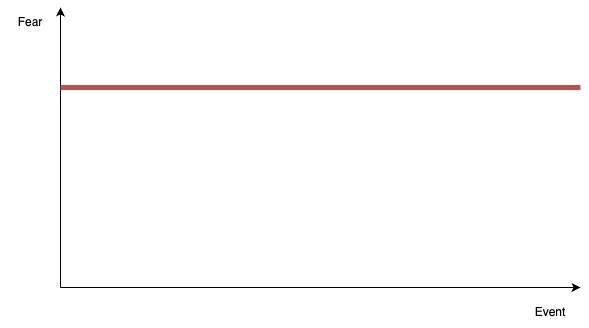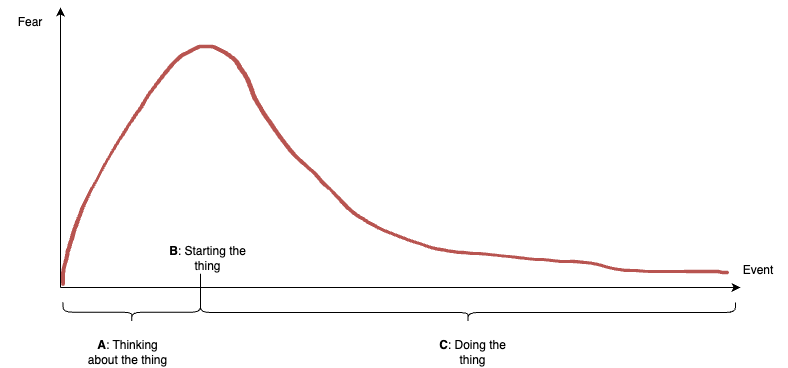The hardest part is the plunge
4 minutes to read
Beep, beep, beep The alarm on my phone wakes me up. It’s 5am. “Why did I sign up for this?” I contemplate as my eyes move back and forth between my bed and my window. It’s October in Toronto, and I signed up for a 6am cold plunge.
Everything in my body tells me to close my eyes and go back to sleep. It’s early morning and I’m still tired. It’s cold outside and I’m about to feel even colder. But I did pay $50 to do morning yoga and hop into a bathtub filled with ice, and I invited a bunch of my friends to join me… I curse past me for outsmarting lazy 5am me and put my clothes on.
Since that day I’ve done maybe 10 cold plunges, with the latest being over 5 minutes long. I enjoy it enough that I now try to do it monthly. Eventually I want to get to 10-15 minutes this year, and if the opportunity arises, I want to try a plunge in the middle of a lake somewhere.
So how was the first plunge? The minutes of anticipation before it were by far the most uncomfortable part of the experience. I stood in line for 10 minutes, watching the people in front of me plunge into ice cold water, and shiver in it for two minutes. Eventually I let the women behind me go first because I’m a gentleman. Then I let my friends go first because I’m a great friend. And once I was out of socially acceptable reasons to postpone it, I had to face the bath, take a deep breath in and just do it. And… it actually was not as bad as I thought. Worse, I actually enjoyed it enough that I did it again 30 minutes later!
This leads me to something I’ve been contemplating for a while: Starting is the hardest part.
We encounter uncomfortable things often: whether that’s a cold plunge, going to a social event where you don’t know anyone, or asking for a promotion. In my experience, starting is the hardest part. Why?
Because it’s uncomfortable and we are biologically driven by pain and pleasure. We seek pleasure and avoid pain. Being uncomfortable is psychologically painful so we’ll do our best to avoid it. We make up little stories in our head to justify the safety of our comfort zones: I shouldn’t ask for that promotion because the economy is in a bad spot and I should be grateful to have a job. Am I even good enough to deserve it? If I get promoted, I’ll get a lot of new responsibilities and I don’t know if I have the time for it right now. What if I can’t handle it? I’m really busy today so maybe I’ll ask next week, or the week after that.
While some of these thoughts might have a grain of truth, in an effort to avoid pain, we exaggerate their likelihood or their importance. How often have these worst case scenario actually happened? And if they do happen, it rarely is or feels as bad as we thought it would. The interpretation of an event is usually significantly worse than the event itself.
We also have a skewed view of how uncomfortable something will be. This is how my brain interprets something I’m uncomfortable doing:

I picture it as this constant level of anxiety/discomfort. In reality, the following is a more appropriate description:

My anxiety rises as my brain does overtime drawing up imaginary doomsday scenarios. I then start doing the thing at which point the anxiety peaks. My anxiety then decreases as I acclimatize to the new environment and become more comfortable navigating it.
This is why I enjoy doing ice baths. They likely have some health benefits(I’m lazy, but google it and let me know), but to me the biggest draw is getting comfortable being uncomfortable. It’s feeling the initial fear, feeling all the made-up reasons not to do it, but learning to push past point B, and training my brain that fear should be considered but can also be safely ignored. Fear has a valid evolutionary benefit: You should be afraid of snakes, lions and tasty mushrooms in a forest. Those things can kill you. Saying no to someone won’t. Asking someone out won’t. Public speaking won’t.
So where do we go from here? The lesson, for me at least, is that when facing a difficult task, make it your goal to just start. While outcomes are often out of our hands, starting is something we have 100% control over. Instead of aiming to exercise today, make it your goal to show up at the gym. If you’re terrified of public speaking, make it your goal to just show up to a Toastmasters class. And if you’re afraid of a silly ice bath, make it your goal to just step in :)